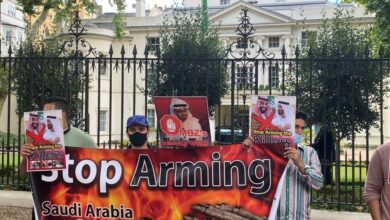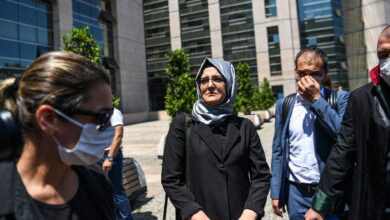US sanctions on MBS a first step towards his fall

The Saudi academic Dr Abdullah Al-Awda said that the US sanctions against the Crown Prince entourage, following the publication of the report of the murder of journalist Jamal Khashoggi, the beginning of the political toppling of Prince Muhammad bin Salman.
Al-Odah said, in statements, that as much as the declassification of the US intelligence report on Khashoggi’s killing was influential in the condemnation of the Saudi crown prince.
However, the most important thing, according to Al-Odah, is the protocol aspects that preceded it that might suggest the nature of the US dealings with the Saudi crown prince in the future.
President Joe Biden announced that he would contact Saudi King Salman before publishing the report, unlike his predecessor in the White House, who allowed the aspiring prince to have an equal link with the US administration in the White House.
Al-Odah added: The critical contact between the US President and Muhammad bin Salman. The US President clarified that the communication was between him and the King and not the Crown Prince.
Al-Odah stressed that this step is practical (they dealt with Mohammed bin Salman as the Minister of Defense and meet with the US Secretary of Defense).
Al-Awda believed that the US sanctions, although they did not target bin Salman personally, are the beginning of his political isolation by isolating his entourage and placing them under sanctions.
New issue
He continued: Practically now, bin Salman is almost banned from travel, he has criminal cases in Europe, and he has at least four points in America.
The Saudi dissident revealed that a new lawsuit would soon be filed in Britain against the crown prince.
“Bin Salman has become an internationally condemned person after the United Nations report, as well as the US intelligence, which officially confirmed Mohammed bin Salman’s involvement in the crime,” he concluded.
Bin Salman entourage
The US State Department launched a new sanctions policy, named after the late Saudi journalist Jamal Khashoggi, that includes the royal guard and 70 involved in the crime.
The new sanctions aim to restrict the access of those working for foreign governments to silence dissidents abroad to obtain visas to enter the United States.
The US Secretary of State announced the imposition of the “Khashoggi embargo” on 76 people from Saudi Arabia to implement the new policy.
This followed the release of a US intelligence report confirming Crown Prince Mohammed bin Salman’s involvement in ordering the killing of the late journalist.
Blinken said: In October 2018, the world was horrified at the killing of Khashoggi, a permanent resident of the United States, in the Saudi consulate in Istanbul, Turkey.
He added: Individuals must exercise their human rights and fundamental freedoms without fear of government reprisal, punishment or harm.
He stressed that Jamal Khashoggi paid with his life for expressing his beliefs.
Blinken recalled a statement by President Joe Biden, on the occasion of the second anniversary of Khashoggi’s killing, in which he affirmed that what happened would not be in vain and that “we owe his memory to the fight for a more just and free world.”
“To this end, I announce today the policy of + Ban Khashoggi +, which is a new policy for restricting visas according to Article 212 (a) (3) (C) of the Immigration and Nationality Law,” Blinken said.
US sanctions
Khashoggi’s ban allows the State Department to impose visa restrictions on individuals who directly engage in serious anti-dissident activities outside of regional boundaries on behalf of a foreign government.
Family members of these individuals may also be subject to visa restrictions under this policy, if necessary, Blinken says.
In the first US implementation of the decision, more than 70 Saudi officials have imposed sanctions, including officials in the Royal Guard.
A senior official in President Joe Biden’s administration said the approach aims to create a new starting point for relations with the kingdom without breaking a core relationship in the Middle East.





